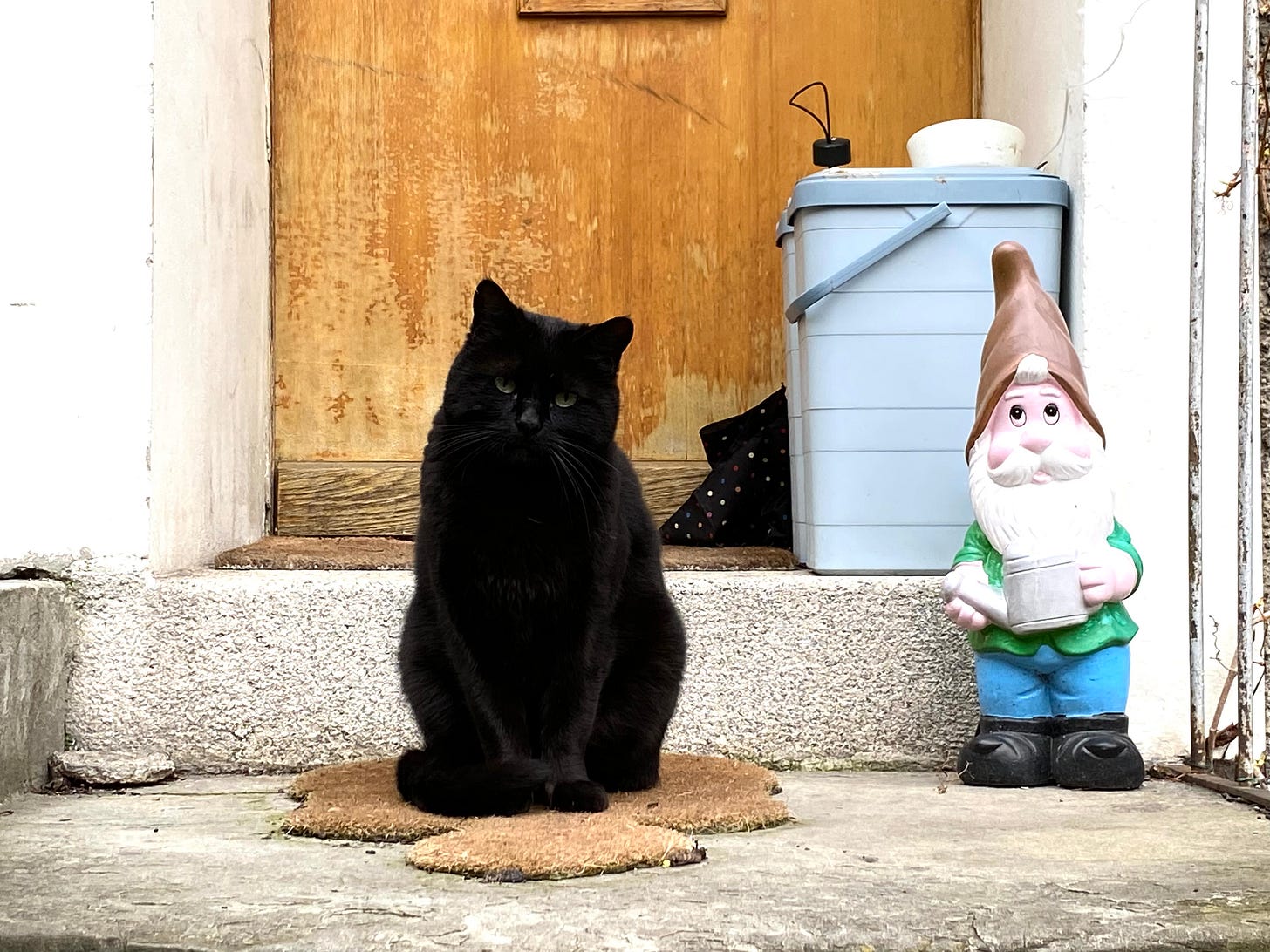Our daughter, Casey, is a cat person trapped in a family of dog people. When Casey was in middle school, our neighbors very kindly let her come over whenever she wanted to pet their cats, Annabel, Libuše, and Marcus, and Casey cared for the cats when our neighbors were on vacation. Libuše and Marcus were sweeties, but Annabel, well, not so much. Annabel wouldn’t permit anyone in our family except Casey to pet her. She roamed the neighborhood and haunted us: Sometimes we would look up from dinner to see Annabel on the fence outside our window, peering in at us with apparent ill-will. We were intruders in her territory.
Casey wrote a poem about Annabel, which she has allowed me to share with you all, in honor of Halloween and of black cats everywhere.
But first . . .
The Bookshop Book Club
There is still time to join in (or to read the book later on your own). Here are links to the previous book club posts: Introduction, week 1, week 2, and week 3.

This week, I won’t summarize the plot of the final chapters, just in case anyone would still like to read the book and wants to avoid spoilers. Instead, I’d like to hear from you.
In the book’s last sentence, Florence “sat with her head bowed in shame.” Why do you think she feels this way? Is Florence simply a victim, or does she bear some responsibility?
Are there any parallels to Florence’s story in our own time?
How do you feel about how Christine ends up? (I am going to write a post about Christine in a couple of weeks, and it would be great to include your thoughts.)
What did you like best about the book? Why? Do you have a favorite quote to share?
Elegy for My Neighbor’s Cat
by Casey
You were everything a cat should be—
Haughty, princess-like on inky paws
that stalked the nightmares of every bird and mouse in town.
From your small height, you looked down on me,
poised upon a fencepost
or from the ground,
your body a small knot of shadow,
peridot eyes winking with indignation.
I still recall your languid, liquid leaps
from sidewalk to fence-top, when you deigned
to let me stroke your back.
Something came away with my hand—
a tuft of fur, always,
a palm full of dust,
pollen in the spring and melted snow in the winter.
You arched like cathedrals, eyes closing,
making yourself monochrome as you pushed your head in my hand,
whiskers like plastic doll hair in your antique satin face.
They say you would have been a god in Egypt,
where your feline great-great-great-great grandfathers came from.
Now you are the devil of small beasts,
death smaller than a breadbox.
You never ate them.
You picked your wet food instead,
shoulders hunched like a haughty heiress,
ashamed to eat such humble fare.
You left no evidence of your murders, either,
except the many-layered woodwind chorus
that returned days after your departure.
They always say black cats are black as night,
But your fur was neither so dark nor so deep.
Maybe black like charcoal,
flecked with gray from flames too hot to burn pure ash,
or black like cast iron,
glimmering unevenly in dark recesses.
Maybe black like loamy soil,
soft and pillowy and warm with decay as your fur,
or, alas,
black like the asphalt you cat-napped on for the last time.
How about you, readers? Is there a pet in your neighborhood that has meant a lot to you at some time in your life? Please share your thoughts in the comments!
The Tidbit
Would you like another cat poem? In 1943, Benjamin Britten composed the cantata Rejoice in the Lamb, taking 48 lines of Christopher Smart’s poem Jubilate Agno for the lyrics. Smart wrote the poem between 1757 and 1763, when he was confined in an asylum. (You can read more about the composition, the poem, Britten, and Smart here.) Below is a stunning performance by the soprano Miranda Colchester of “For I Will Consider My Cat Jeoffry”:
For I will consider my Cat Jeoffry.
For he is the servant of the Living God duly and daily serving him.
For at the first glance of the Glory of God in the East he worships in his way.
For this is done by wreathing his body seven times round with elegant quickness.
For he knows that God is his Saviour.
For God has bless’d him in the variety of his movements.
For there is nothing sweeter than his peace when at rest.
For I am possessed of a cat, surpassing in beauty,
From whom I take occasion to bless Almighty God.
The lyrics above are a brief excerpt from Smart’s original poem, and they also change the order of the lines somewhat. You can read Smart’s whole, weirdly wonderful, tribute to his Cat Jeoffry here.
And Casey shared yet another cat poem with me, supposedly written by Data from Star Trek: The Next Generation. “Ode to Spot” can be sung to the tune of “I Am the Very Model of a Modern Major General.” Curious? You can find it here. (Thanks, Casey!)






My first cat, Mycroft, was also black, and very hard to photograph. Usually I got little more than an outline. But there were a few notable excpections, here's one of my favorites: https://rlareau.net/sharefiles/Mycroft.jpg He lived to be 22 and died peacefully, and he was a good cat.
Shame seems to be too strong of a word here, as though Florence had done something wrong. None of her choices were bad, even her real mistakes were few. Her downfall was really the result of the miserable collection of people in the town, so she's really only guilty of poor judgement. The author creates too much bad luck as well, which is some point or lesson that escapes me.
In the movie version, as Florence is leaving, the house is seen going up in flames, I think it's revealed that Christine set the fire. I doubt Fitzgerald would have approved of that, as it would give the audience too much pleasure. I would have liked instead that Florence default on the bank loan, and tell Mr. Kible that since her house was the collateral, and the town had taken it by force without compensation, that he would need to sue the town for the repayment of the loan. And to go fuck himself.
My favorite part was when Florence asked Christine what kind of present she might want. "Not one of those books." and "I'd rather have the money instead." made me laugh out loud. Then Christine returns wearing a new cardigan with the money Florence gave her in lieu of ... a cardigan. What a brat.
I would like to find if the author had any deeper meaning intended, perhaps one needs to be more British to see it. I think I am frustrated by the style, which is not quite a driving plot, but not just a poetic collection of scenes. Perhaps the author means us to feel better about ourselves when we see characters that are collectively so pathetic? Or do we feel inspired to be just a little bit nicer to our neighbors, more supportive in small ways, and to do our homework before we think to take on a project which is potentially doomed from the start.